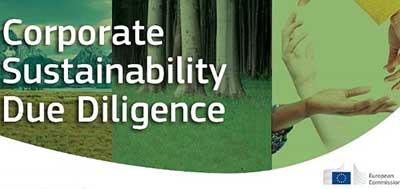Date: 11/11/2022
Relevance: GS-2: Effect of Policies and Politics of Developed and Developing Countries on India’s interests; The European Union and India.
Key Phrases: Directive on Corporate Sustainability Due Diligence, Human rights, Environmental Responsibility, European Union, Investment Protection Agreement, Trading partner, European Green Deal, Limited Liability, Child Labour and Trafficking in India, Labour Laws, European Commission, European Parliament, Global Market, Sustainability, Textiles, Chemicals, Machinery and Electrical equipment, Agricultural products.
Context:
- The European Commission has adopted a proposal for a Directive on corporate sustainability due diligence.
Key Highlights:
- The European Union relaunched negotiations with India for a Free Trade Agreement, and launched separate negotiations for an Investment Protection Agreement and an Agreement on Geographical Indications (GIs).
Impacts of EU’s Sustainability:
- EU companies that are covered under the current form of the proposed
directive are going above and beyond to protect themselves.
- They are putting in place robust mechanisms to mitigate any possible risks.
- This implies clear contractual clauses, establishment of complaint procedures, increased third-party assessments, and capacity building etc.
Importance of EU
- The EU is India's third largest trading partner, accounting for €88 billion worth of trade in goods in 2021 or 10.8% of total Indian trade.
- India is the EU’s 10th largest trading partner, accounting for 2.1% of EU total trade in goods.
- The EU predominantly purchases textiles (17.8%), chemicals (15%), machinery and electrical equipment (13%) and agricultural products (7.9%).
- About 6,000 European companies are present in India, which provide over 1.7 million direct jobs and 5 million indirect jobs across sectors.
Directive on Corporate Sustainability Due Diligence
- About
- The European Commission published a proposal for a Directive on Corporate Sustainability Due Diligence.
- It aims to foster sustainable and responsible corporate behavior throughout global value chains.
- Applicability
- EU limited liability companies:
- Group 1: with 500+ employees on average and a net worldwide turnover in excess of EUR 150 million in the last financial year.
- Group 2: not in Group 1 but operating in high-risk sectors, with more than 250 employees and a net worldwide turnover in excess of EUR 40 million in the last financial year.
- Non-EU limited liability companies active in the EU:
- Group 1: with a net turnover in excess of EUR 150 million in the EU in the financial year preceding the last financial year;
- Group 2: not in Group 1 but with a net turnover in excess of EUR 40 million, but not exceeding EUR 150 million in the EU in the financial year preceding the last financial year.
- EU limited liability companies:
- Key Features
- It will require certain large EU and non EU companies to set up mandatory due diligence practices to identify, prevent or mitigate, and ultimately terminate adverse impacts of their corporate activities on human rights and the environment.
- The CSDD proposal is an important component of the European Green Deal towards a sustainable future.
Issues with India
- Child labour and trafficking in India
- As per the 2011 census, there were over 11 million child laborers
in India.
- Covid and its impact on economic security and education led to an increase in these numbers.
- A large number of these children fall somewhere within the blind spots of corporate supply chains.
- As per the 2011 census, there were over 11 million child laborers
in India.
- Gaps in prosecution for violations and rehabilitation of victims
European Union
- About
- The European Union (EU) is a supranational political and economic union of 27 member states that are located primarily in Europe.
- Branches of power
- Executive Branch
- European Council
- It sets the broad political direction to the EU.
- It convenes at least four times a year and comprises the president of the European Council, the president of the European Commission and one representative per member state.
- European Commission
- It acts both as the EU's executive arm, responsible for the day-to-day running of the EU, and also the legislative initiator, with the sole power to propose laws for debate.
- European Council
- Legislative Branch
- European Parliament
- Council of the European Union
- European Commission
- Judicial Branch
- The Court of Justice is the judicial branch of the
European Union and consists of two courts:
- Court of Justice and
- General Court.
- The Court of Justice is the judicial branch of the
European Union and consists of two courts:
- Executive Branch
Way Forward:
- The time is right for the government and corporations to transparently and objectively evaluate our sustainability systems and improve on them.
- Companies must establish clear and transparent contractual clauses with all tiers of suppliers, contractors and sub-contractors for risk assessment and mitigation, disclosure and remediation for human-rights violations.
- Internal audit and training exercises should filter to the lower tiers of the supply chain, where maximum risk lies.
- Companies can introduce greater technology and automation to help reduce tiers, informality and fragmentation in supply chains.
- Partnerships with third party experts and the government can help integrate existing best practices in their operations.
Conclusion:
- With stronger international laws and greater prioritization of human rights and environment-related impacts in their overseas trade relationships, Indian companies must buckle up and prepare for a global market moving speedily towards greater sustainability.
Source: Live-Mint
Mains Question:
Q. How will the EU's sustainability push impact India? What are the major issues and also suggest the measures to address these issues. (250 Words).








